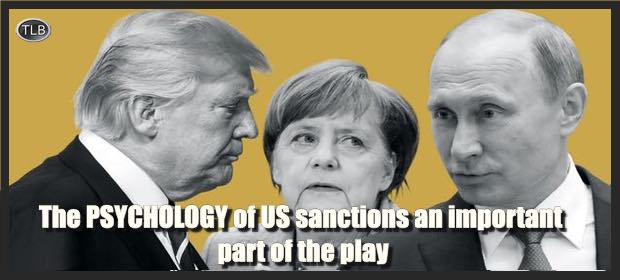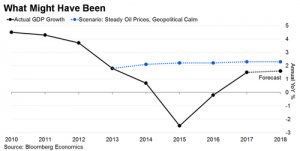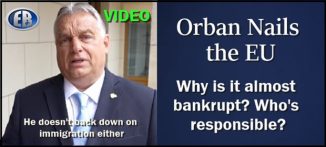
Europe Losing Appetite On Russia Sanctions As Banks Remain Skittish
Nearly five years after the Crimean crisis and subsequent western sanctions on Russia, Europe is increasingly “losing the appetite for punishing actions against Moscow,” writes Bloomberg in a new report suggesting investors are impatiently waiting for clarity on Russia as its economy enters bunker mode. Even willing European companies are now “starved of financing” on the mere threat of more punitive measures to come.
However, it’s precisely the psychological uncertainty of more looming US sanctions as lawmakers make continued threats over accusations of Russian meddling in the 2016 presidential elections that’s part of Washington’s arsenal. And when sanctions are handed down, it’s further the cloudy ambiguity in terms of what’s targeted when that produces a chilling effect: “The most effective sanctions are the ones that aren’t entirely clear, because the lack of clarity has a chilling effect on investment,” Frank Schauff, chief executive officer of the Association of European Businesses in Russia, told Bloomberg. He cited one sanctions law passed by Congress last year that has absurdly confusing language saying particular actions “will be in place for a long, long time.”

Pavel Chinsky, head of the Franco-Russian Chamber of Commerce and Industry, noted past data on countries under US sanction shows Washington throwing its weight around is enough to keep willing companies away: “The U.S. has such a major role with the weight of the dollar and the extra-territoriality of their laws,’’ he said. For example, “French banks don’t finance Franco-Russian projects. Full stop. Not because it’s forbidden, but because they’re being ultra-cautious,” Chinsky said. “They all fear repercussions on their U.S. activities,’’ he added.
The mere risk of new measures following last month’s Kerch Strait incident has been enough to keep foreign businesses waiting nervously on the sidelines, despite the EU showing no signs that it will penalize Moscow in the wake of the incident. During talks in Paris on Monday French Economy Minister Bruno Le Maire and his Russian counterpart Maxim Oreshkin announced plans for further cooperation in areas including energy, nuclear, space and tourism, but this is easier said that done as neither Macron nor Putin appear willing to find a way forward on contrary Ukraine stances.
Given that tensions are higher than ever, with Ukraine still under temporary martial law as its president hypes a “Russian invasion” threat, and with a Russian build-up of forces including S-400 air defense systems on Crimea, there’s been no offered EU track for easing the penalties. Instead it’s bunker mentality on both sides at a moment that sliding oil prices have added to Russia’s pain, though as one recent study on the sanctions impact since 2014 study found, “The underperformance has been much bigger than crude alone can explain.”

Thus even an oil price recovery likely won’t have much impact on Russia’s pummeled economy, per Bloomberg:
With sluggish annual growth of less than 2 percent and the Russian state’s expanding role in business, even a recovery in oil prices isn’t likely to give a boost to the economy, according to Putin’s former finance minister, Alexei Kudrin, who now heads the Audit Chamber that monitors the budget.
For now, major European companies with operations in Russia are hunkered down but are finding it hard to finance expansion because banks are wary of U.S. reprisals. German investment averaged $550 million annually since 2013 compared to $3.6 billion a year from 2007-2012. French companies invested $666 million in the first half of 2018, down from a peak of $2.6 billion in 2010.
Last month Putin confirmed while speaking at an investor conference in Moscow that annual trade with the EU “had fallen by almost half from a peak of $450 billion to $236 billion,” according to the Bloomberg report.

And one recent study claimed that US sanctions have knocked as much as a whopping 6% off Russia’s economy over the past four years when compared to expected GDP growth after 2014 without sanctions in place.
For a reminder of just what types of statements out of the White House and State Department have kept European banks and investors skittish, US Assistant Secretary of State for International Security and Nonproliferation Christopher Ford said just over a month ago related to the Skripal case: “Under statute… there is a menu of options if you will, things that need to be considered. As part of that, we do not have an inter-agency decision answer on what those pieces are yet. It is under active consideration.” He threatened further at the time: “The second round of sanctions under the statue is a more draconian menu than the first round.”
Projected/imagined GDP growth after 2014 without sanctions in place assuming prior patterns…

Pompeo has promised over the past weeks efforts toward a further squeeze on Russian energy export efforts, saying, “We will keep working together to stop the Nord Stream 2 project that undermines Ukraine’s economic and strategic security.” Nord Stream 2 is expected to be put into operation by the end of 2019 and is seen as a vital European lifeline Russia needs to halt its economic slide, and an issue where Europe – most especially Germany – has shown itself unwilling to bow to US demands.
It remains the “unknown” and corresponding emotional/psychological impact of US economic warfare and potential negative fallout for those third parties who “might” be caught in the cross-hairs that appears precisely a secondary effect in place by design of Washington planners.
************
Original article
ER recommends other articles by Zerohedge




